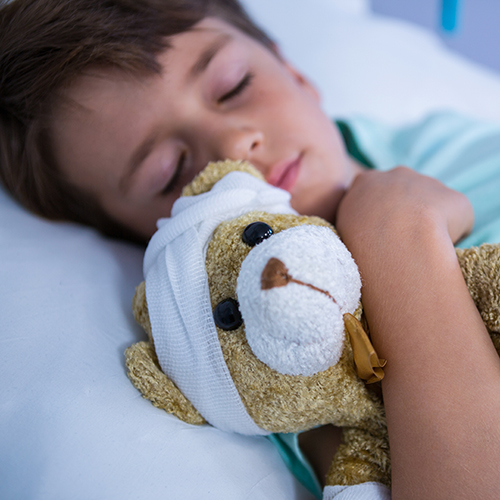28 May 2025

Every day, nearly 100 children present to Australian emergency departments with suspected medicine poisoning. It’s a startling statistic, but a reality that could be avoided, according to new research from the University of South Australia.
Now, the latest Pharmaceutical Society of Australia (PSA) Medicine Safety report – produced by UniSA – shows that many medicine-related problems among children and teenagers are not only foreseeable but, in most cases, preventable.
The report reveals that most medicine harms are caused by unsafe off-label use, unexpected drug interactions, accidental poisoning, or overdoses from common household medicines like paracetamol.
Specifically, it shows that:
- Medicine-related problems cause about 93 children to present at hospital each day – half of these are preventable; additionally, about 40 of these children and teens are admitted, and half of these are also preventable.
- About 120,000 children (aged under 14) experience a bad reaction to medicines over a six-month period – nearly a third of these are children aged four and under.
- Accidental poisonings are common – every day, seven children attend the emergency department for medicine-related poisonings; three children are admitted.
- Paracetamol and antidepressants are mostly responsible for poisoning admissions – Younger boys account for most poisonings in children under 10, while girls account for most poisonings among teens. In 2022-23, 7,332 children (aged 0-19) were admitted to hospital for medicine poisoning.
- The cost of medicine-related harm in children is at least $130 million every year – related Emergency Department attendances accounting for $30 million, and an additional direct cost of medicine poisonings to the health system is estimated at $40 million per year.
The National Health Survey shows that most children and teens have between one and four different medicines dispensed over the past six months; 50% have had at least one PBS medicine dispensed in the past six months; about 184,000 have had between five and nine medicines dispensed; and an estimated 11,500 have had 10 or more.
Lead researcher, UniSA’s Dr Imaina Widagdo, says children and teenagers are particularly vulnerable to medicine-related harm.
“Medicine use among children and teenagers is common. Yet given that nearly 100 children present at hospitals each day for adverse reactions, it’s clear that more needs to be done to protect their health,” Dr Widagdo says.
“Medicines are meant to help – and usually they do. But there are important things that parents and carers need to know. Firstly, unlike adults, children have developing bodies, which means they can respond to medicines differently than adults. Secondly, because medicines are rarely trialled with children, the doses, safety and efficacy of certain medicines may not be fully known or always accurate.
“What this tells us is that we need to take much more care when prescribing and monitoring medicines for children and young people.”
It’s a timely reminder to take extra care with children’s medicines, particularly following the recent Therapeutic Goods Administration (TGA) safety warnings on Risperidone dosing earlier this month, where accidental administering of more than the prescribed dose led to multiple children being hospitalised.
“As we see greater incidences of chronic health conditions among children and teens, it’s important for parents and carers to prioritise the safe storage and careful administration of medicines at homes, schools, and childcare,” Dr Widagdo says.
“Often, there are no child-specific preparations available, so extra care is needed when storing and dosing medicines.
“Finally, we encourage parents and carers to report any suspected adverse medicine reactions to the TGA’s adverse drug reaction reporting system, which can help build more accurate medicine safety profiles.”
Better education, safer prescribing, and more informed use at home could significantly reduce these risks.
“We all have a responsibility to protect children and teenagers from the incorrect use or accidental consumption of medicines. Because when it comes to children’s safety, prevention is always better than cure.”
If an overdose occurs, a medication error is made, or poisoning is suspected, immediately call 000 for an ambulance if there's a medical emergency or call the Poisons Information Centre on 13 11 26 for advice.
The full research team includes Dr Imaina Widagdo, Dr Renly Lim and Professor Libby Roughead.
…………………………………………………………………………………………………………………………
Contact for interview: Dr Imaina Widagdo E: Imaina.Widagdo@unisa.edu.au
Media contact: Annabel Mansfield M: +61 479 182 489 E: Annabel.Mansfield@unisa.edu.au




